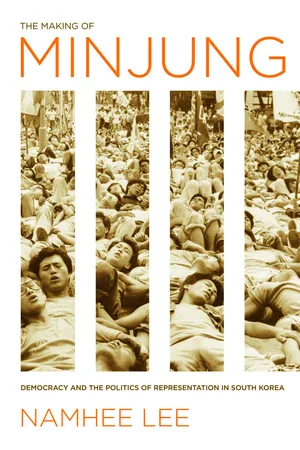
The Making of Minjung
Democracy and the Politics of Representation in South Korea
- 368 pages
- English
- PDF
- Available on iOS & Android
About this book
In this sweeping intellectual and cultural history of the minjung ("common people's") movement in South Korea, Namhee Lee shows how the movement arose in the 1970s and 1980s in response to the repressive authoritarian regime and grew out of a widespread sense that the nation's "failed history" left Korean identity profoundly incomplete.The Making of Minjung captures the movement in its many dimensions, presenting its intellectual trajectory as a discourse and its impact as a political movement, as well as raising questions about how intellectuals represented the minjung. Lee's portrait is based on a wide range of sources: underground pamphlets, diaries, court documents, contemporary newspaper reports, and interviews with participants. Thousands of students and intellectuals left universities during this period and became factory workers, forging an intellectual-labor alliance perhaps unique in world history. At the same time, minjung cultural activists reinvigorated traditional folk theater, created a new "minjung literature," and influenced religious practices and academic disciplines.In its transformative scope, the minjung phenomenon is comparable to better-known contemporaneous movements in South Africa, Latin America, and Eastern Europe. Understanding the minjung movement is essential to understanding South Korea's recent resistance to U.S. influence. Along with its well-known economic transformation, South Korea has also had a profound social and political transformation. The minjung movement drove this transformation, and this book tells its story comprehensively and critically.
Frequently asked questions
- Essential is ideal for learners and professionals who enjoy exploring a wide range of subjects. Access the Essential Library with 800,000+ trusted titles and best-sellers across business, personal growth, and the humanities. Includes unlimited reading time and Standard Read Aloud voice.
- Complete: Perfect for advanced learners and researchers needing full, unrestricted access. Unlock 1.4M+ books across hundreds of subjects, including academic and specialized titles. The Complete Plan also includes advanced features like Premium Read Aloud and Research Assistant.
Please note we cannot support devices running on iOS 13 and Android 7 or earlier. Learn more about using the app.
Information
Table of contents
- Contents
- Acknowledgments
- Notes on Romanization and Translation
- Introduction: Minjung, History, and Historical Subjectivity
- Part I. The Crisis of Historical Subjectivity
- Part II. Building a Counterpublic Sphere
- Part III. The Politics of Representation
- Conclusion: The Minjung Movement as History
- Bibliography
- Index